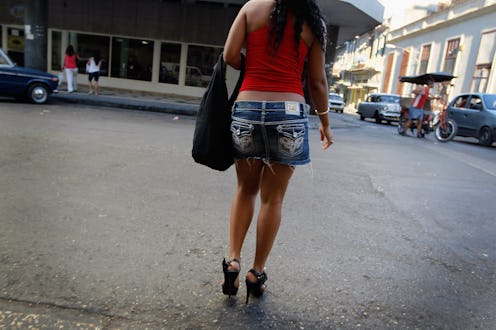Life
How Street Harassment Becomes Internalized
The New York Post: putting the "ass" in "class" since 1801. The publication's latest example of shameless viral bait? Writer Doree Lewak’s piece Tuesday on catcalling, “Hey, Ladies — Catcalls Are Flattering! Deal With It.”
Lewak's basic premise is simple: Street harassment can be a compliment. It can even improve self-esteem. “When I know I’m looking good,” she wrote, “I brazenly walk past a construction site, anticipating that whistle and ‘Hey, mama!’ catcall. Works every time — my ego and I can’t fit through the door!”
As Bustle's Lucia Peters wrote in response Tuesday, it is true that it's not inherently anti-feminist to enjoy a catcall.
If it makes you feel good, then by all means, enjoy it ... But know, too, that not all of us want to interact when we’re trying to get from point A to point B. Keeping our heads down, avoiding eye contact, and plugging headphones in our ears are clear indications that we want to be left alone...Not a compliment, and not something we should just have to “deal with.”
Reading Lucia's piece got me thinking: To what extent do I tend to enjoy catcalls? Am I reflexively annoyed by Lewak's New York Post piece because it's highly problematic and feels like someone telling me to smile — or simply because its main point hits a little too close to home?
The discussion this week about street harassment as compliment made me remember a poem I wrote about a year ago. At the time, I was struggling with disordered eating and generally low self-esteem. My boyfriend and I had broken up, and I missed him badly. I had terrible writer's block. I walked to my favorite cafe to try to write.
On my walk there, a man catcalled me, and so I sat down and wrote this poem:
it’s not that i hate the come-ons
some days
(i hate to admit)
i feel downright grateful for them.
no.
what i hate
is how i always look down.
can’t help but smile politely
with tight white-lady lips
shoulders hunched
sorry for the imposition of my body
and the embarrassment it’s caused both of us.
sometimes, in anticipation of a group of men
i’ll tell myself
don’t look down this time
don’t look down!
and then,
fuck.
i look down.
bad posture made even worse
i smile curtly
then feel guilty about the fact
that i expect these men to do
exactly what they end up doing.
look down, hunch shoulders, smile.
when else am i so polite?
when i was a teenager
i started noticing men checking out my ass.
soon, i found myself assessing other womens’ asses
looking at how they went with them jeans
and feeling an aesthetic, even sexual appreciation
but mostly
(what i hate)
a judgement
as to whether or not these women
no — these asses — were successful.
What I was feeling — and perhaps what many of us couldn't quite explain upon being offended by Lewak's piece, is that street harassment isn't only messed up because it makes us feel unsafe. It's also messed up because sometimes, that objectification actually comes to feel good. It becomes internalized, or in my case, a judgement placed upon other women as well.
"Besides, hard hats need something to look at while they’re on their lunch break," Lewak writes. "I can be that objectified sex thing for them! What’s so wrong about a “You are sexy!” comment from any observant man?"
Well, what makes street harassment (and the male gaze in general) so frustrating to me is the fact that a part of me has come to expect it, even depend on it, as a gauge for how attractive I am.
i hate
that sometimes
when a man i’m expecting to harass me on the street
doesn’t look at me at all
i’m disappointed, worried even
that i’ve lost a certain mirror i could rely on
like that man who told me
what a beautiful waist you have!
that August afternoon when i was feeling fat.
what i hate most:
i sometimes avoid my body in the mirror
as if it were the man on the street.
i look down
sorry for the imposition
the embarrassment it’s caused both of us
only difference is, i don’t bother to smile.
a woman with a room of her own
is neutered by the fact
that she does not occupy her own body.
(what would it look like if we set up camp
and protested that?
we are the shoulders-hunched-look-down-smile-i-feel-fat-today percent)
I wrote this feminist poem as I sipped on a chai tea latte. The barista had put too much honey in it. At the time, I considered sugar a "bad" food. As sipped it guiltily, I both fed off my street harasser's compliment and was filled with rage over it. Perhaps, that would appear to be a contradiction. But that was my reality. These are the complexities that come with being a woman simply trying to occupy her own body.
The online feminist community was not so much angry that Lewark's piece admitted that street harassment can feel complimentary. We were frustrated that once again, someone had reduced our experience to a thesis so simplistic.
Being a woman is so much more complicated than that. It can be ugly and beautiful, disempowering and empowering at once. It is the internalized experience of being viewed, too often, as something external.
what i don’t hate:
sometimes,
i have nights
when i manage to check myself out:
chest thrust forward, eyes fixed
a wide internal grin
i pass myself internally
and force myself to stare, take my beauty in.
i don’t look down.
i see it all.
i occupy myself.
and i’m sure:
if those men could see
what i feel
they wouldn’t find the words.
